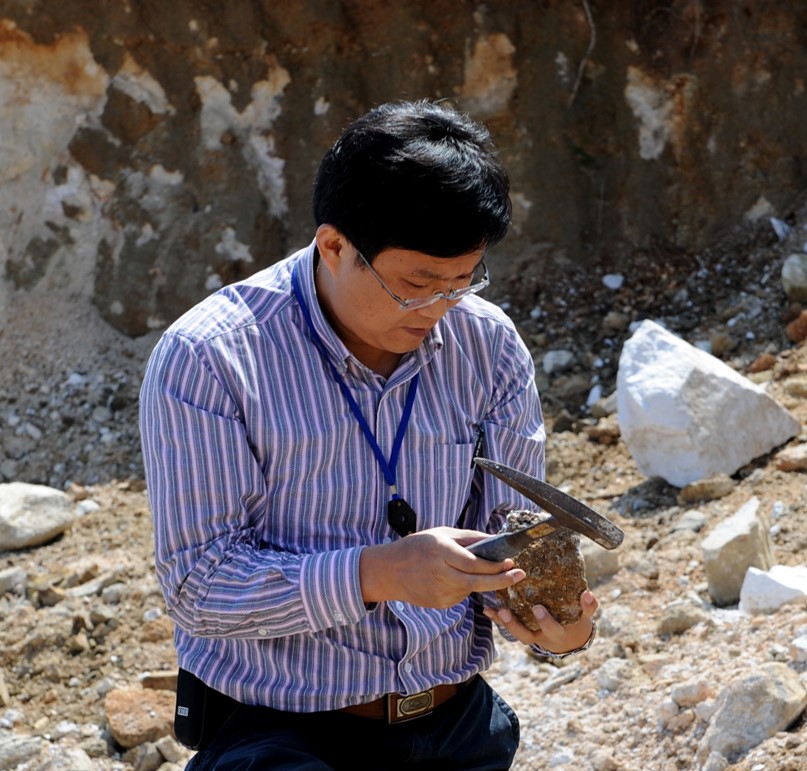
Professor XU Yigang from the Guangzhou Institute of Geochemistry (GIG) of the Chinese Academy of Sciences (CAS) was elected as a Fellow of the American Geophysical Union (AGU), as the organization announced its 2021 class of Fellows on Tuesday September 28th Eastern Standard Time.
Recognized by the AGU fellowship for his breakthroughs in igneous petrology and geochemistry, Professor XU has made remarkable and lasting contributions to mantle dynamics and magma genesis. His work has influenced a wide range of fields in geosciences, such as geology, geochemistry, petrology, tectonics, seismology, and mass extinction by global climate change. His accomplishment over decades in elucidating fundamental geological processes may be illustrated by a few examples.
A classical concept in plate tectonics is the persistence of old, thickened continental cratons underlain by a strong tectosphere that is detached from the asthenosphere by buoyancy. XU was among the first to challenge the paradigm that cratonic lithosphere lasts forever, by proving that an old craton was in fact destroyed in the case of the North China Craton.
He is also a leading figure in the study of the formation of large igneous provinces (LIP). These volumetrically massive eruptions of lava are now recognized as being capable of global-scale environmental and biological impact, potentially a major contributor to mass extinction and biosphere evolution. Professor XU's study on the Permian Emeishan large igneous province in southwestern China was coincident with the Great Plume Debate in the international community, and his work has made the Emeishan one of the best characterized LIPs in the world.
Traditionally, intraplate magmatism is considered to be triggered either by a thermal anomaly or lithospheric extension-induced decompression, or both. Most recently, based on his studies in eastern China, XU has revealed a third mechanism to generate intraplate basalts by fluid-fluxed melting within the Big Mantle Wedge. The novel petrologic model for intraplate basalt that he and his team put forward has opened a new window into understanding crust-mantle interaction and volatile cycling budgets.

XU Yigang works in the field. (Image by XU Yigang)
Professor XU’s collected published work has now been cited more than 20,000 times and he was recently listed among the world’s top 2% most-cited scientists. He is one of the erudite few who can point to two first-authored papers cited more than 900 times that are not related to each other but based in entirely different fields.
He has been the recipient of a number of awards throughout his career. Beginning as a grantee of the prestigious National Science Fund for Distinguished Young Scholars, he has received two of China's National Natural Science Awards, and has been elected as a CAS Member and Fellow of the Geological Society of America (GSA) in recent years.
Outside of purely academic work, XU has established considerable reputation as a hard worker and influencer who demonstrates exceptional organizational capabilities. He organized an international conference of the International Association of Volcanology and Chemistry of the Earth’s Interior (IAVCEI), bringing it to his home institution in Guangzhou in 2006, and served as the Chairman of IAVCEI in China. He was the chair for Theme 5 (From Crust to Mantle) of the 2016 Goldschmidt Conference, and has been a regular keynote speaker at symposiums home and abroad, including AGU Chapman Conference, AGU Fall Meeting, the Goldschmidt Conference, and the Annual Meeting of the Chinese Geoscience Union (CGU). He also serves as editor for several domestic and international journals, and currently as Secretary General for the CGU Annual Meeting.
After graduation from Zhejiang University, XU received his PhD in Fundamental Geochemistry at the University of Paris VII and completed his post-doctoral research at Royal Holloway, University of London. Since 1995, he has worked at GIG, where he exhibited impressive leadership as director during 2009-2020. His efforts have brought this relatively young, highly dynamic institute to the cutting edge in many research areas.
Founded in 1919, AGU is one of the world’s most influential academic organizations in Earth and space sciences, boasting more than 60,000 members from 148 countries and regions. Since 1962, the organization has chosen fewer than 0.1% of its members for Fellows, as a way to celebrate their outstanding achievements and contributions by pushing the frontiers of their science forward. This year the honor went to 59 individuals, two of whom work in institutions on the Chinese mainland.

86-10-68597521 (day)
86-10-68597289 (night)

52 Sanlihe Rd., Xicheng District,
Beijing, China (100864)

